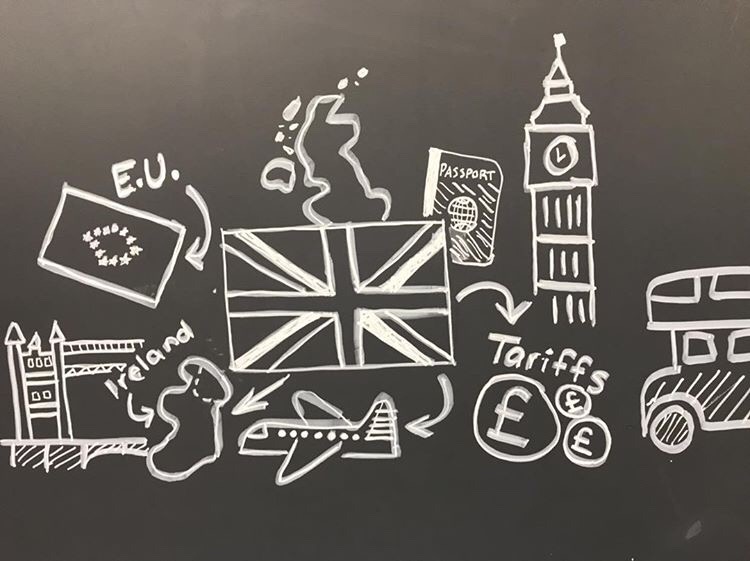The mystery of Brexit
The U.K. has until April 12 to come up with a plan so that they may properly leave the E.U.
April 4, 2019
The U.S. political field is a mess right now. Congress refuses to agree on anything; 2020 candidates are already at each other’s throats and the public seems more divided than ever. So let’s focus on something else.
A meer 4000 miles away, the U.K. is finding themselves in just as much chaos as the U.S. The topic: Brexit, the withdrawal of the U.K. from the E.U. Which, despite the screaming in Parliament, is really all that it is. Br itain exit ing.
What is the European Union?
The European Union or E.U. is a nation-state that is formed by 28 countries. Supposedly maintaining a sense of unity among the continent, all of the different governments work together to pass laws, provide checks and balances and create policies that better the political situation for everyone. However, with all of the common benefits, come common restrictions. For the U.K. these benefits are no longer worth the restrictions. For that reason on June 23, 2016, it voted to leave.
The problem now is that though they want to leave, they don’t have a clue how. Prime Minister Theresa May and Parliament have been working very closely for the past few months to write the terms and conditions that would be put in place for the official parting between the U.K. and the E.U. and it seems that there are three solutions: a hard Brexit, a soft Brexit or a no-deal. Whatever happens, both Parliament and the E.U. would have to approve the plan in order for it to pass.
What are the issues?
There are many issues being weighed, but the main ones are immigration, Northern Ireland, trading and laws. Along with each of these solutions comes a different arrangement for each issue.
Immigration is one of the main reasons that the U.K. left the E.U. in the first place. One of the terms of being part of the union is having open borders. This means if you were a citizen of France, the E.U. would allow you to live in Germany and still be a citizen. The U.K. though, wanted a better hold on who went in and out of the country and was frustrated by not being permitted to do so through their alliance. Thus the U.K. slogan, “Take Back Control.” This means that citizens of the homeland living abroad might have to pick one side or the other and the same with citizens of other countries from the E.U. that currently live within the U.K.
Northern Ireland on the other hand, is a completely different situation. Because it is part of the U.K. it would have to follow all of the new Brexit laws, but the conflict is that when it split ways with the rest of Ireland one of the agreements was that there would be an open border. All of this amounts to the fact that either the U.K. would break agreements with Ireland and have the border closed, or not fully separate from the E.U. and have the border open.
When the U.K. leaves it would also dissolve the existing free trade deals and tariffs would be put in place. These would not change U.K. operating businesses that only face competition from within, but for those that rely on other countries, there would be a huge shift.
What are the different plans?
A hard Brexit would mean a large shift from current policy. Immigration would be more controlled by the U.K., but those living abroad from the main island would not need to worry as they would be protected by any form of a Brexit deal. The situation in Northern Ireland would be complicated, it is not final that a physical wall would be built; however, because that would not be in correspondence with the E.U. laws for open borders, the union would not approve of the deal. Trade would change as tariffs would be put in place, but this would make it more difficult for corporations who rely on other countries for supplies or production.
A soft Brexit is still a split from the E.U. but with less change. The main concept is that in this situation, the U.K. and the E.U. would have more alignment with one another. Immigration would still change no matter what type of Brexit is finalized, but minimal adjustments would be put in place. There would be no demand for a hard border in Northern Ireland as trade between the two nations would be somewhat the same. Although, the downside is that with a softer Brexit, the U.K. would not be able to trade with countries like the U.S. and would still be bound by many of the same laws that it is trying to break free from, calling it anti-democratic.
Finally, if Parliament is not able to come to a deal they will fall out of the union with no transition period. This plan would be the last resort due to how it might impact the economies of both the U.K. and other E.U. countries. It could also possibly leave the U.K. with a food shortage and low medical supplies. In Northern Ireland a hard border wall would be the only option and citizens that live abroad would not have a specific arrangement. Unfortunately, this plan is becoming more likely due to no one in Parliament being able to agree on anything. The first deadline of March 29 has already been missed which has been extended to April 12 and could be extended even more. If the U.K. is not able to come up with a deal by May 22 it will leave “with or without a deal” said by Prime Minister Theresa May.
As time continues on, the U.K. has no option right now but to sit and wait. Everything and everyone is up in arms but if you still have no idea what is going on or what will happen, you need not to worry because honestly, no one really knows what will happen.









